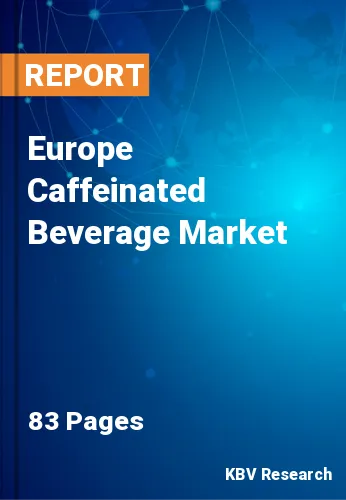The Europe Caffeinated Beverage Market is expected to grow at a CAGR of 6.4% during 2019-2025. The Germany market dominated the Europe Caffeinated Beverage Market by Country 2018, and would continue to be a dominant market till 2025; thereby, growing at a CAGR of 5.1 % during the forecast period.
In 2018, the segment of carbonated soft drinks accounted for the largest market share. Due to the high demand for RTDs and carbonated soft drinks around the globe, the segment will remain dominant over the coming years. In addition, product innovations would drive demand even more specifically when concerned with flavours and use with natural sweeteners like stevia.
Sales of carbonated soft drinks are primarily based on the company's ability to build new products based on changing consumer needs. Market players opt for distribution through large-scale distributors and supermarkets like Safeway, Walmart, and Carrefour to increase access to multiple consumers for their products. Technological development has changed the beverage industry's production process. Companies concentrate on using equipment and technology that can increase production output as lead time and cost are decreased.
Traditional and home-made drinks have been popular for a long while. However, from the past two years, the demand for non-carbonated packaged beverages is gaining immense popularity, with a year-on-year increase. Consequently, various factors, such as increased disposable incomes and health awareness, lead to increased demand for non-carbonated drinks. This growth encourages industry players to focus more on health and energy drinks, driving the market for energy drinks. Consumers have increasingly opted in recent years for naturally safe, packaged foods and beverages associated with organic, fortified/functional, or better-for-you products, as they are perceived to provide the essential natural nourishment.
However, These products contain caffeine, which could trigger health issues such as Blood Sugar Swings. People with Type 2 diabetics should avoid caffeine as it can potentially impair insulin’s action. Consumption of caffeine can lead to a detectable rise in blood sugar levels. The consumption of these products can also lead to gastrointestinal problems as these products have stimulants. Caffeine could lead to contractions of stomach muscles - possibly causing abdominal pain, diarrhoea, and increased bowel movements. People with irritable bowel syndrome, Crohn’s disease, or colitis should be very cautious while consuming caffeinated beverages. It is observed that caffeine inhibits the absorption of some nutrients. It also leads to urinary excretion of calcium, magnesium, potassium, iron, and trace minerals.
Based on Distribution Channel, the market is segmented into Online and Offline. Based on Product, the market is segmented into Carbonated soft drinks, Energy drinks, RTD Tea and coffee and Others. The report also covers geographical segmentation of Europe Caffeinated Beverage market. The countries included in the report are Germany, UK, France, Russia, Spain, Italy and Rest of Europe.
Free Valuable Insights: Caffeinated Beverage Market in Europe is expected to register a CAGR of 6.4% during the forecast period (2019-2025)
Key companies profiled in the report include Keurig Dr Pepper, Inc. (Dr Pepper Snapple Group), Monster Beverage Corporation, Nestle S.A., PepsiCo, Inc., Red Bull GmbH, Rockstar, Inc., Taisho Pharmaceuticals Holding Co. Ltd., The Coca-Cola Company, AriZona Beverages Company LLC and Innovation Ventures, LLC.
Market Segmentation:
By Distribution Channel
By Product
By Country
Companies Profiled
Our team of dedicated experts can provide you with attractive expansion opportunities for your business.

